|
Introduction
Depression Era Radical Novels
Depression Era Radical Plays
Depression Era Humor in Cartoons and Satire
Depression Era Novels about Displaced Farmers Published
before the Appearance of Steinbeck’s The Grapes of Wrath
SCRC Home
|
A
Selection of Depression Era Radical Plays
 |
“Isn’t it a glorious thing to be able to say to bourgeois
Broadway: here, from the depths of our poverty, without your resources
of high-salaried stars, and publicity men, and hundred-thousand-dollar
budgets, and all the rest of the rhinestone-studded machine, working
against all the odds of class prejudice and the skepticism of bourgeois
critics, the struggling revolutionary theatre has matched you technically?”
(Michael Gold, “Stevedore,” New Masses 11, no. 5 [1 May 1934],
28). |
| “A dramatic high spot was the Theatre Guild’s production
of They Shall Not Die, John Wexley’s revolutionary drama of
the Scottsboro frame-up. The play ‘failed’ since its natural mass
audience—workers and students—were effectually barred by the customary
high Broadway admission scale. Had the Guild made special arrangements
with workers’ organizations, the play would have run for many more
weeks. They Shall Not Die was a powerful, well-built play,
as stirring an experience in the theatre as any play of recent years. |
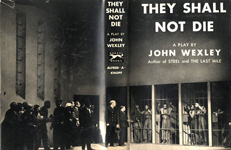 |
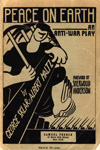 |
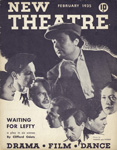 But
the outstanding development of the season was the successful establishment
of the Theatre Union as a producing organization. Its first production,
Peace on Earth, a revolutionary anti-war play by George Sklar
and Albert Maltz, ran for sixteen weeks to an audience of over 125,000.
Its second production, the current Stevedore, Paul Peters’
and George Sklar’s play about the super-exploitation of Negro longshoremen
and the growing solidarity with their white fellow workers, seems
destined for an even longer run. We look forward to next season in
the expectation that the Theatre Union will give us not only revolutionary
drama but also revolutionary staging” (New Theatre [1 June
1934], 3). But
the outstanding development of the season was the successful establishment
of the Theatre Union as a producing organization. Its first production,
Peace on Earth, a revolutionary anti-war play by George Sklar
and Albert Maltz, ran for sixteen weeks to an audience of over 125,000.
Its second production, the current Stevedore, Paul Peters’
and George Sklar’s play about the super-exploitation of Negro longshoremen
and the growing solidarity with their white fellow workers, seems
destined for an even longer run. We look forward to next season in
the expectation that the Theatre Union will give us not only revolutionary
drama but also revolutionary staging” (New Theatre [1 June
1934], 3). |
 |
“I was a radical once, a boy...a
fool of a boy — I murdered him, and he’s waiting round every corner
to murder me now” (John Howard Lawson, Success Story: A Play
[New York: Farrar and Rinehart, 1932], 212).
“Waiting for Lefty has been suppressed more
often than any other play in the history of the American Theatre.
|
“On January 6, 1935, an audience assembled at the Civic
Repertory Theatre in New York City for a New Theatre Night, witnessed
by the birth of a new era in American social drama, and the awakening
of a new singer. The play was Waiting for Lefty (winner of the
New Theatre–New Masses Play Contest) presented by the Group Theatre, and
the author was Clifford Odets. Even then, when the audience rose in their
seats and cheered until their throats were sore, no one realized fully
the widespread significance of this occasion. Today, Waiting for Lefty
is playing in twenty different cities from coast to coast, presented by
twenty different companies, to audiences ranging from the silk hats and
satin gowns of the Hollywood intelligentsia to the textile workers who
make those silks and satins in Paterson, New Jersey. Six months after
its downtown debut in New York City, the Group Theatre’s Broadway production
is still ‘packing them in’” (Alice Evans, “Waiting for Lefty,” New
Theatre [June 1935], 25).
| “The Federal Theatre is a pioneer theatre, because
it is part of a tremendous rethinking, redreaming, and rebuilding
of America....It...represent[s]
a new frontier in America, a frontier against disease, dirt, poverty,
illiteracy, unemployment, despair, and at the same time against selfishness,
special privilege and social apathy” (Hallie Flanagan, “Introduction,”
Federal Theatre Plays [New York: Random House, 1938], xii–xiii). |
 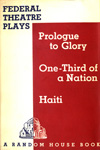 |
 |
“I don’t agree with Schwarz that protest is futile.
I think that every voice that is raised has its effect. My opinion
is that if you have convictions, you shouldn’t be afraid to express
them” (Elmer Price, We, the People: A Play in Twenty Scenes
[New York: Coward-McCann, 1933], 138). |
| “You know this mine ain’t owned by one man. Nossir!
It’s a company. Got five hundred mines if they got one. An’ do you
know where they’re shippin’ their coal? To their own steel mills!
An’ do you know how they’re shippin’ it? On their own railroads! You
can’t beat that, boy. You start at this company an’ pretty soon you
can find out who makes the laws an’ whose elects the Governor. An’
all I know is if you’re gonna be wantin’ your gravy you better stay
friends with the cook. Yessir!” (Albert Maltz, Black Pit [New
York: G. P. Putnam’s Sons, 1935], 43). |
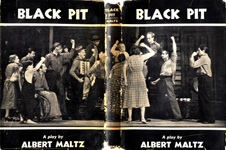 |
“A certain cleverness in striking a compromise between
the world about him and the world within has characterized the work of
the greatest as well as the least of successful playwrights, for they
must all take an audience with them if they are to continue to function.
Some may consider it blasphemy to state that this compromise must be a
considered and conscious act—will believe that the writer should look
in his heart and write—but in the theatre such an attitude leaves the
achievement entirely to chance, and a purely chance achievement is not
an artistic one” (Maxwell Anderson, Winterset: A Play in Three Acts
[Washington, D.C.: Anderson House, 1935], v).
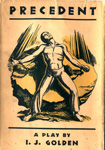 |
“We have a law in this state, a viciously archaic and
outdated law, a law which makes human life of less value than stupid
rules of procedure written on the statute books. Once a man is adjudged
guilty and sentenced to death in the lower courts, and the judge of
the lower court has denied a motion for a new trial, no matter what
new evidence, new facts, may subsequently present themselves, no court—not
even the Supreme Court, can consider them” (I. J. Golden, Precedent:
A Play about Justice (New York: Farrar and Rinehart, c1931], 138). |
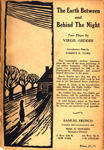

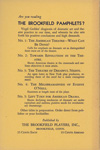
“The plays which reach the people are the plays which
the people not only understand but receive from; those plays from which
we illustrate our ideals, our imagination and our standards as to what
is vital and what is art. No play which is important artistically is removed
from life; it takes its very pattern and strength from the always active
powers of life” (Virgil Geddes, Left Turn for American Drama [Brookfield,
Conn.: Brookfield Players, 1934], 42).
|
New City, New York
October 12, 1940
Mr. Archer Huntington
1 East 89th Street
New York City
Dear Archer:
We had a wonderful first night and were on our
way to a success but the critics slapped us down very hard and we’re
still more or less horizontal.
Coming back to the road after it was all over we
found a great change in the landscape. The leaves had turned red
and gold, frost was in the air and the Huntingtons were gone. They
had drifted away like wood smoke leaving only rumors from Connecticut
way. My hat is only two years old but I shall certainly need a new
one soon. If you come back this way and have time for a little conversation
please let us know. We miss you.
Love to Anna and to you from Mab and me.
Sincerely,
Max
[Maxwell Anderson]
|
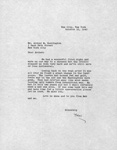

|
|

